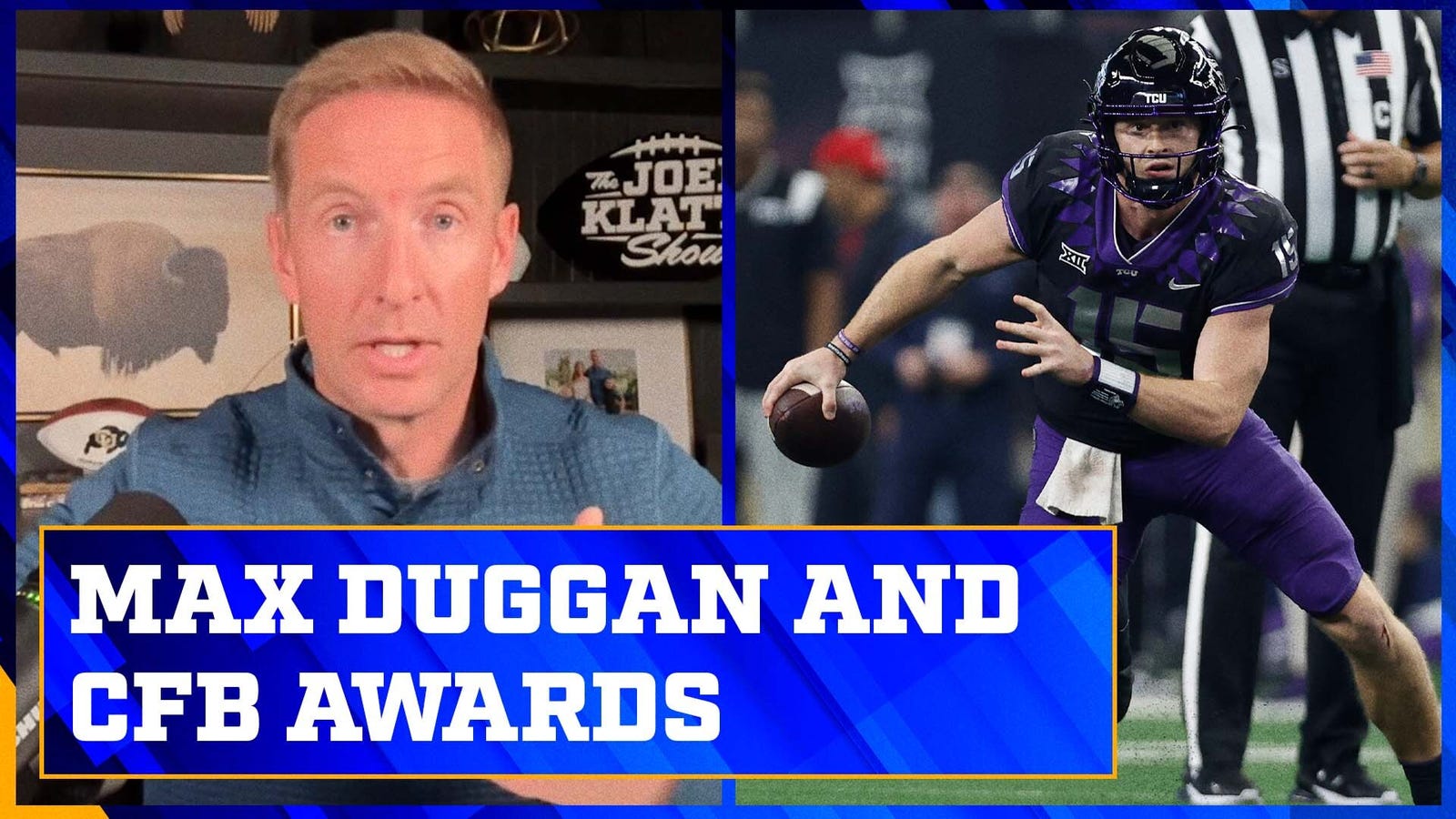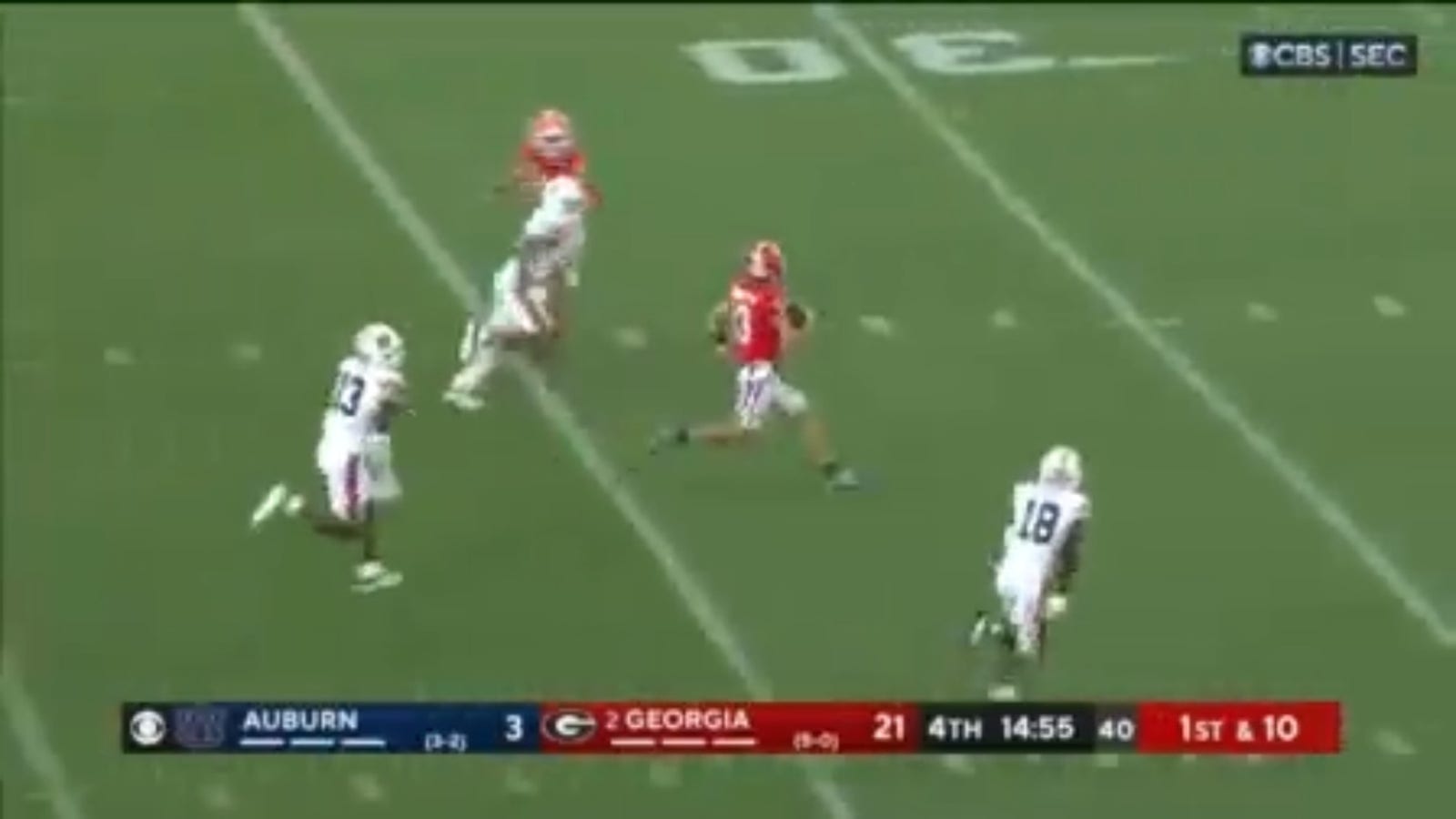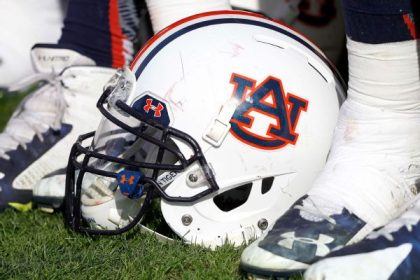LOS ANGELES — Seven days have passed since the first of this year’s College Football Playoff semifinals began with a wondrous twist: the unmistakable, inimitable growls of famed UFC announcer Bruce Buffer. He ignited the crowd with his usual theatrics from an end zone at State Farm Stadium in Glendale, Arizona.
“That’s Bruce Buffer!” said former Michigan tight end Jake Butt, now an analyst for Big Ten Network, as his eyes widened from an elevated perch in the press box. Thousands of fans roared with delight.
Once the game began, Texas Christian galloped away from Michigan to extend its Cinderella season by earning a shot at Georgia, the defending national champion, and in doing so the Horned Frogs laid the groundwork for an unusual matchup between two programs thriving behind their rags-to-riches quarterbacks. It’s fascinating to imagine how Buffer would introduce both signal callers:
Introducing first, fighting out of the purple and white corner: A warrior holding a record of 13 wins, one loss. He lost a quarterback competition in fall camp and fought through two surgeries to correct a heart condition known as Wolff-Parkinson-White syndrome. The fans disowned him before they learned to love him. He stands 6 feet, 2 inches tall, weighing in at 210 pounds. Fighting out of Fort Worth, Texas, by way of Council Bluffs, Iowa … presenting … the Heisman Trophy runner-up and Davey O’Brien Award winner … Max Duuugggaaannn!
And now, introducing the champion, fighting out of the red and black corner: A grown man holding a record of 14 wins, no losses. He walked on at Georgia for one season before leaving to attend junior college. He returned to the Bulldogs as a scholarship athlete and led them to a title last season. He stands 5 feet, 11 inches tall, weighing in at 190 pounds. Fighting out of Athens, Georgia, by way of Blackshear, Georgia, and Ellisville, Mississippi … presenting … the reigning, defending, undisputed national champion … Stetson “The 25-year-old” Bennnnnettttt!
Not quite the résumés most folks expect on the sport’s biggest stage.
But putting fun and jokes aside, the unorthodox paths taken by both Duggan and Bennett cut against a recruiting industry obsessed with player rankings, star power and seven-on-seven tournaments that have morphed into the Instagram-able cousins of the NFL scouting combine, affectionately known as the Underwear Olympics. Their storybook ascensions from afterthoughts and also-rans to the upper echelon of college football reinforces the amount of guesswork involved with extrapolating high school quarterbacks at the next level. And their combination of unwavering commitment and dogged self-belief in the face of unrelenting criticism underscores just how pivotal the mental side of quarterbacking really is — especially in the social media era.
“I think it’s all between the ears, how well they handle the pressure,” said TCU tight end Jared Wiley, a former high school quarterback. “Is the guy a winner? Is it hard to beat him because he’s just that kind of a competitor? I think with quarterbacks it’s so much about how poised you are and what’s between the ears rather than just mechanical issues.”
So how did they get here?
Duggan was a four-star prospect from the heart of Big Ten country who spent three seasons as TCU’s starter before first-year head coach Sonny Dykes benched him in favor of backup Chandler Morris. He brushed aside the possibility of transferring to another school to complete his degree at TCU, and teammates say there was no discernible difference in his demeanor before and after the depth chart displacement. When Morris went down with an injury in the season opener, Duggan reclaimed the starting job and promptly threw for 3,546 yards and accounted for 40 total touchdowns en route to the national title game at SoFi Stadium on Monday night. Now, Dykes says Duggan should be remembered in the pantheon of TCU football alongside former quarterback Andy Dalton, whose 2010 team went undefeated and beat Wisconsin in the Rose Bowl.
Bennett, on the other hand, was a two-star recruit who grew up four hours southeast of Athens. He was rated the No. 2,569 overall prospect by the 247Sports Composite and held scholarship offers from Columbia, Georgia Southern, Mercer and Middle Tennessee State, pushing them aside to walk on at Georgia. A freshman season came and went without so much as a single appearance from Bennett, who was one of four Bulldogs to be named Offensive Scout Team Player of the Year, and that preempted a humbling decision: remain at Georgia and try to climb the depth chart without much playing time, or transfer somewhere else to get more reps on the field. He chose the latter and, in 2018, led Jones College to a 10-2 record while throwing for 1,840 yards and 16 touchdowns to earn a three-star rating as the No. 166 junior college prospect.
“His mom and he came into my office and said he was leaving to go to junior college,” head coach Kirby Smart said, “and that he wanted to play, and that he felt he was good enough to play, and he wanted to go play. And he knew there was no guarantee that he was going to play at our place the next season, but he knew he could play (somewhere) if he went to Mississippi (and got some experience).
“They sat in there with complete confidence, and I didn’t doubt him. I just didn’t know if it was at Georgia (where he would get an opportunity). And that conviction they had when they sat in my office should have said, ‘There’s something special about this guy.’”
At the L.A. Convention Center, where the CFP held its media day event, a slew of quarterbacks and coaches offered a variety of explanations for how players like Duggan and Bennett — each of whom is now the engine behind his team’s success; each of whom was invited to New York City last month as a Heisman Trophy Finalist — can get overlooked on the recruiting trail and then again within their own programs after arriving on campus.
Some pointed toward the philosophical differences between coaches known for having enough patience to develop quarterbacks over several seasons and others who lean primarily on prospects they believe to be plug-and-play options as underclassmen. Some mentioned a wider gulf in the caliber of instruction from one high school team to another, a discrepancy further complicated by quarterbacks whose families can afford additional private instruction. Others noted the issues posed by COVID-19, when some states canceled high school football while others didn’t, which in turn produced quarterbacks with vastly different amounts of experience despite identical class standings.
But the reason most commonly cited by Bulldogs and Horned Frogs alike was how difficult it is to forecast the kind of inexorable willpower their current quarterbacks have in spades, that uncanny ability to “raise the temperature of a room” simply by being in it, as Dykes explained when asked what makes Duggan so special.
It’s the moxie Bennett channeled to complete 12 of 14 passes for 207 yards and two touchdowns to erase a second-half deficit against Ohio State. It’s the lung-busting effort Duggan summoned in a shootout win over Michigan when he accounted for four of his team’s five offensive touchdowns a week after bloodying himself during a narrow loss in the Big 12 title game.
“If you’ve got that,” said TCU offensive coordinator Garrett Riley, “that’s gonna go a long ways in college football. Everybody’s good; every quarterback room is going to be competitive, I don’t care which school you go to. So if you’ve got somebody that’s mentally strong, mentally tough and understands those things, that brings a lot of value in the recruitment part.”
The challenge, of course, is finding it.
Michael Cohen covers college football and basketball for FOX Sports with an emphasis on the Big Ten. Follow him on Twitter @Michael_Cohen13.
Read more:
Top stories from FOX Sports:

Get more from College Football Follow your favorites to get information about games, news and more













